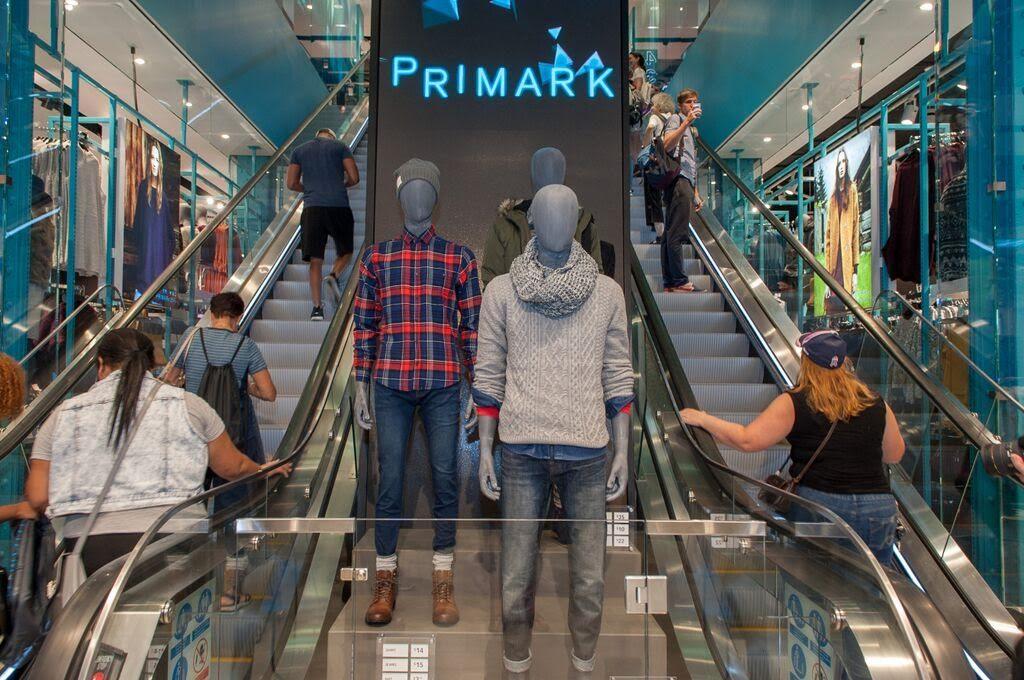By Kathryn Stavish and Sam Haas, news staff
As shoppers flocked to the Boston branch of discount clothing chain Primark, drawn in by cheap prices and flashy signage, a second flurry of activity was already brewing steps from the store’s Downtown Crossing entrance, which opened its doors for the first time on Sept. 10.
Labor organizers began planning to unionize Primark employees over the summer. Since the retailer’s Boston opening, a campaign has kicked into high gear according to Fabricio Da Silva, a strategic campaign creator with United Food and Commercial Workers Union (UFCW) Local 1445.
“We currently have a very aggressive campaign to sign up Primark employees,” Da Silva said.
Originating in Ireland, the Downtown Crossing location is the chain’s first US store. While opening-day customer traffic was lower than expected, business has been steadily good, according to employee Nefeteria, whose manager told her not to give her last name.
“Last Saturday, they had to put up barriers at the front of the store,” Nefeteria said. “There were lines all down Summer Street, and one even going back around the other side of Washington.”
The store is known both for cheap goods – women’s jeans are listed online at $17 and men’s dress shirts are priced as low as $10 – and a commitment to fair labor practices, Nefeteria said.
Located in the Burnham Building at the intersection of Washington and Summer Street, Primark occupies the 77,000 square feet that once housed Boston retail icon Filene’s Department Store and the original Filene’s Basement outlet before it shut down in 2007.
The building’s legacy holds significance for UFCW because Filene’s employees were unionized for generations, according to Da Silva. UFCW Local 1445 representatives had expected it to stay that way, he said.
“The prior mayor [Thomas M. Menino] said whoever came into that store would have to be a union store,” Da Silva said. “Walmart tried to come into the space, but because of Menino, they stayed away.”
The labor status of employees isn’t the only new thing about the building. Primark’s redesign of the space, which included the installation of black brick inside and vibrant blue lettering outside, makes it stand out from the office buildings and storefronts surrounding it, said Rachel Friend, 35, of Boston.
“I just saw the sign walking by on the street and decided to come in,” Friend said. “I’m pretty happy with my shopping experience so far.”
Primark’s prices are also a strong pull, according to freshman international affairs major Asta MacKie. Originally from San Francisco, MacKie said she hadn’t heard of Primark before coming to Boston. She couldn’t resist going to the store soon after it opened, although she felt some misgivings.
“While I do love the clothes and prices, I’m very skeptical as to how they get their prices to be so cheap,” MacKie said.
To other many Primark shoppers, the company’s stated commitment to fair wages and social responsibility is another selling point, said Julie Nagler, 18, of Concord.
“I think it’s awesome,” Nagler said. “It feels good to know that the money I’m spending is going toward a company that supports all these great causes – especially since the prices are so good.”
Despite some customers’ support, though, Primark’s history of living up to its own code of conduct is mixed.
In 2013, 668 people were killed or injured in the Rana Plaza factory collapse in Bangladesh while working for one of Primark’s suppliers. To date, the company has paid out over $14 million in compensation to those affected, according to a press release dated March 31.
In March, Greenpeace recognized Primark for its dedication to the elimination of hazardous chemicals. Primark has been a member of the Ethical Trading Initiative, a group committed to fair labor practices and living wages, since 2006.
While those accomplishments should be applauded, labor practices are unfair to workers at Primark’s Boston store, Da Silva said.
“The No. 1 problem is they have workers from a temp agency that are getting paid more money than the direct employees,” Da Silva said. “It really shows what the company is about – they aren’t willing to create real, sustainable jobs for the Boston area.”
Other issues facing employees are the lack of guaranteed hours, disorganized management and poor communication from bosses, according to Da Silva.
UFCW’s biggest concern, though, is anti-union pressure that Da Silva claims some managers are exerting on workers.
“Managers are approaching employees and telling them to avoid the union people,” Da Silva said. “It might be local managers trying to be the heroes and corporate headquarters doesn’t know anything about it. Still, it goes against the code of conduct posted on their own website.”
The News was unable to confirm this report.
Da Silva was quick to add that his group doesn’t plan to discourage shoppers from buying Primark products, acknowledging that many people enjoy the products and the prices with good reason.
UFCW labor organizers simply want the company to expand its labor concessions to the new store, Da Silva said.
Primark’s website reports the company pays workers “at a minimum the national legal standards or industry benchmark standards” but does not specify what that number is in the US or any of the other nine countries in which people are employed by the retailer.
“All over the world, Primark has 60,000 workers who enjoy the benefits of union jobs, fair conditions and good wages,” Da Silva said. “We want the same thing here.”
Primark headquarters failed to respond to multiple requests for comment as of press time.
Photo courtesy Margaret Meluzio, Havas PR









